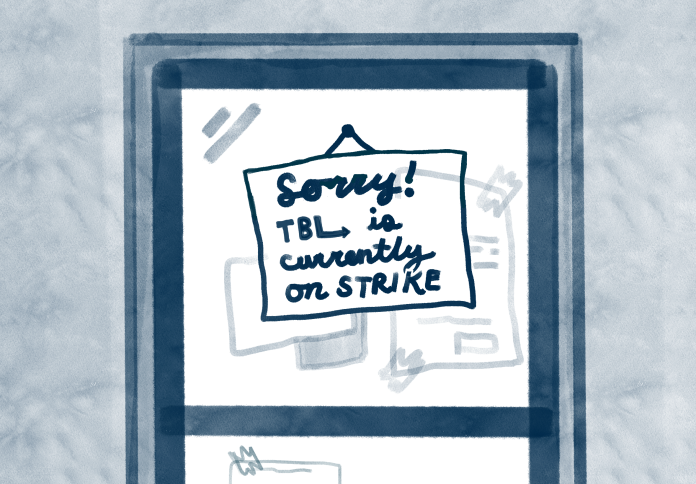Natalie Aymond
Opinions Editor
The Bottom Line (TBL) recently returned from a work “strike” due to the withholding of fall quarter pay from UC Santa Barbara’s (UCSB) Associated Students (AS). While this strike lasted around two weeks, from Jan. 30 to Feb. 13, a large period of time to not be reporting as a weekly-run publication, we were met with the hard decision of having to return before we even received our checks. This executive decision came from the rationality of maintaining our dedication to reporting while also honoring the commitment to provide the opportunity for TBL staff to earn more pay. While we have since been paid after returning to work, this experience in tandem with TBL’s ongoing challenges with AS has left a sour taste in my mouth.
Having worked at TBL for two years now, I have always held pride that our smaller student-run newspaper holds its ground beside other on-campus news sources and operations with more agency among its staff. Although I started as a staff writer, writing a few articles here and there and delivering our print editions on campus, I saw how the morale and promise to uphold students’ well-being and further their journalism experience was always evident at TBL. What has become evident to me this year, however, is that the effort to maintain and uphold this level of support for staff has been met with challenges and, arguably, disregard from the operations within AS.
Having taken an editorial board position this year, I am now more able to both witness the gaps that make us stick out as a UCSB publication, as well as see how we are not able to acquire the financial agency that would make us a more self-run and productive newspaper.
This comes with a year fraught with issues and challenges that TBL has perceived AS to have. While not confirmed to be the root cause of late quarterly stipends, the most notable issue that is observable by both students and community members is the issue of vacancies in numerous work positions in the AS administration. Further, and arguably more crucial in any circumstance of delay or challenges, there seems to be a significant lack of communication between AS and the entities they support. It is these factors and more that contribute to the severe slowing of operations.
At the end of the day, TBL staff rely on each other as a small editorial board of 37, with 10 section editors working upwards of 10 hours a week. However, we also require the engagement of consistent staff. Our team has lost this consistent staff partly because of the instabilities we have experienced this quarter. So while TBL has begun discussing solutions to gain back staff loyalty and boost morale, such as incremental requisitioning, AS needs to bring a commitment to timeliness and transparent communication to the table to match it.
I do have consideration for the work and time that AS needs to complete and support all its entities and workers. I also have consideration for the fact that not every quarter will be the same, with the many surprises our school has already had to face. But, what should hold from quarter to quarter, is both timeliness and a united, communicative front from AS. I receive plenty of weekly emails from AS entities and offices pertaining to meetings, updates, or applications for positions. Yet when it came down to TBL finding answers for why our checks were six weeks late, it felt like weeks of a continuous dead-end of messages like “they are being processed” or “they are next up for processing.”
As a student body set out to “help students uphold the high academic standards and give them leadership, employment, cultural and growth opportunities to serve the campus community,” open communication will uphold our ability to serve the campus community when pay falls short. From where I sit, I feel a lack of consideration from AS administration for the necessity of paying — or communicating responsibly about pay — to its organizations.
In turn, these experiences have demonstrated an utter lack of consideration for my time as a working college student. To be clear, I do not say I solely work for the quarterly stipend, as I have found extensive experience and enjoyment in working for TBL. But it is to say that we are full-time students first, who are trying to learn how to run an on-campus publication as part of a small team simultaneously studying, working other jobs, and pursuing other interests and obligations in college. Within that, of course, does come with being students who encounter financial barriers. Pay is significant, and without it, it becomes hard to reason with the hours we dedicate to our journalistic work while other obligations still call for our attention.
As a whole, these issues seem to have dampened our relationship with AS as TBL’s staff grow increasingly more frustrated with waiting on their administration with little conversation about what is actually happening on the inside of their operations.
As representatives of our UCSB undergraduate student body, it should be the job of AS administration to support and uphold the same drive, commitment, and leadership that it promises. Instead, many TBL staff have not felt supported and instead have felt undermined and displaced. We cannot continue to excel in the journalistic goals we set out for ourselves if we are not actively supported by the entity that is supposed to cater to the logistical and financial aspects of our newspaper. A huge portion of this support must come from better communication, especially when timeliness is compromised, and understanding that responsibility is owed to the entities that fall under AS.











